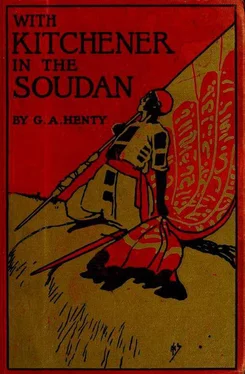Before the supplies had all arrived the position changed, as news came that Berber was being evacuated by the Dervishes. The information was telegraphed to the Sirdar, who at once ordered that a force of the friendly Arabs, escorted by a gunboat, should go up to Berber to find if the news was true. One gun-boat had already arrived, and General Hunter decided on going up in her himself. Two hundred of the Arabs, under Ahmed Bey, were to ride along the bank. They were to be mounted on the fastest camels that could be picked out, so that if they encountered the Dervishes they would have a fair chance of escaping and getting under cover of the gunboat's fire.
"Mr. Hilliard," the General said, "I shall be obliged if you will accompany Ahmed Bey; the Arabs are always more steady if they have an English officer with them. They will be ready to start in an hour. A signaller from the 11th Soudanese shall go with you, and you can notify to us the approach of any strong party of the enemy and their direction, so that the gun-boat can send a shell or two among them as a hint that they had better keep out of range."
As his baggage-camel was by no means a fast one, Gregory at first decided to leave it behind in charge of Zaki, but on going across to the Arab camp Ahmed Bey at once offered to place a fast one at his disposal. He accordingly sent his own animal into the transport yard, committed the heavy wooden case with the greater portion of his remaining stores to the charge of the sergeant of the mess, retaining only three or four tins of preserved milk, some tea, four or five tins of meat, a bottle of brandy, and a few other necessaries; to these were added half a sheep and a few pounds of rice. These, with his tent and other belongings, were packed on the Arab camel, and Zaki rode beside it with great satisfaction, for he had been greatly cast down when his master first told him that he would have to remain behind. All the preparations were made in great haste, but they were completed just as Ahmed Bey moved out of his camp with his two hundred picked men and camels.
Five minutes later a whistle from the steamer told them that General Hunter and the party with him were also on the point of starting. The distance to be traversed to Berber was a hundred and thirty miles, and the expedition was undoubtedly a hazardous one. Even if the news was true that the five thousand Dervishes who had been holding Berber had evacuated the town, it was quite possible that a part of the force had been sent down the river to oppose any advance that might be made, or, if unable to do this, to carry the news of the advance to Mahmud. The Arabs were to keep abreast of the gun-boat, and would, where the shores were flat, be covered by its guns. But at spots where the ground was high and precipitous this assistance could scarcely avail them in case of an attack, unless the hundred soldiers on board the steamer could be landed.
As they rode along, Ahmed Bey explained to Gregory the plan that he should adopt if they were attacked in such a position and found their retreat cut off. "The camels will all be made to lie down, and we shall fight behind them, as in an entrenchment. My men are all armed with rifles the government has given them, and we could beat off an attack by a great number, while if we were on our camels and pursued we should soon lose all order, and our shooting would be bad."
" I think that would be by far the best plan, sheik. Your two hundred men and the hundred the gun-boat could land ought to be able to make a tough fight of it against any number of the enemy. How long do you think we shall be on the way?"
"About four days. The camels can easily travel thirty-five miles a day. We have six days' provisions with us, in case the gun-boat cannot make its way up. Fortunately we have not to carry water, so that each camel only takes twenty pounds of food for its rider and forty pounds of grain for itself. If we were pursued, we could throw that away, as we should only have to ride to some point where the gun-boat could protect us. We could not hope to escape by speed, for the Dervishes could ride and run quite as fast as the camels could go."
CHAPTER X
AFLOAT
THE first three days' journey passed without any adventure. From the natives who still remained in the little villages ihey passed, they learned that the report that the Dervishes had left Berber was generally believed; but whether they had marched for Metemmeh or for some other point was unknown. The people were delighted to see the gun-boat, as until its arrival they had been in hourly fear of raiding parties. They had heard of the capture of Abu Hamed by the British from horsemen who had escaped, but all these had said confidently that Mahmud would speedily drive them out again, and they had been in hourly fear that the Dervishes would swoop down upon them and carry off the few possessions still remaining to them. When within thirty miles of Berber the Arabs had halted on the bank, watching the gun-boat as, with great difficulty, it made its way up a cataract. Suddenly it was seen to stop, and a great bustle was observed on board. An exclamation of grief burst from the Arabs.
" She has struck on a rock!" Ahmed Bey exclaimed.
"I am afraid she has," said Gregory, who had all along ridden by his side at the head of the party. "I am afraid so; I hope she is not injured."
Unfortunately the damage was serious. A hole had been knocked through her side under water, and the water poured in in volumes. A rush was made by those on board, and beds, pillows, and blankets were stuffed into the hole. This succeeded to some extent, and she was brought alongside the bank. The sheik and Gregory went down to meet her. General Hunter came to the side.
"A large hole has been knocked in her," he said to the sheik; "we shall have to get the guns and stores on shore to lighten her, and then heel her over to get at the hole. It
will certainly take two or three days; by that time I hope the other gun-boat will be up. In the meantime, you must go on to Berber. I think there can be no doubt that the Dervishes have all left, but it is most important that we should know it for certain. You must push straight on, and as soon as you arrive there, send word on to me by the fastest camel you have. If you are attacked, you will, of course, defend yourselves. Take up a position close to the river, and hold it until you are relieved. If you can send off news to me by a camel, do so; if not, seize a boat—there are some at every village—and send the news down by water. I will come on at once with everyone here to assist you."
"I will do as you order," the sheik said, "and if you see us no more, you will know that we died as brave men."
"I hope there is no fear of that," the General said cheerfully. " You will defend yourselves as brave men if you are attacked I am sure; but as I am convinced that the Dervishes have left Berber, I think there is little fear of your falling in with them."
Then he went on in English to Gregory.
" Keep them moving, Mr. Hilliard. Let them go as fast as they can; they are less likely to get nervous if they are riding hard than they would be if they dawdled along. If they press their camels they will be in Berber this afternoon. See that a man starts at once to bring me the news."
"Very well, sir; I will keep them at it if I can."
The sheik rejoined his band, which gathered round to hear the result of his interview with the white general.
"The steamer is injured," he said, "but she will soon be made right and will follow us. We are to have the honour of going on and occupying Berber, and will show ourselves worthy of it. There is little chance of our meeting the Dervishes; had they been in Berber we should have heard of them before this. If we meet tham we will fight, and you, Abu, who have the fastest camel among us, will ride back here at all speed, and the General and his soldiers will come up to help us. Now, let us not waste a moment, but push forward. In five hours we shall be at Berber, and throughout your lives you will be proud to say that you were the first to enter the town that the Dervishes have so long held."
Читать дальше












